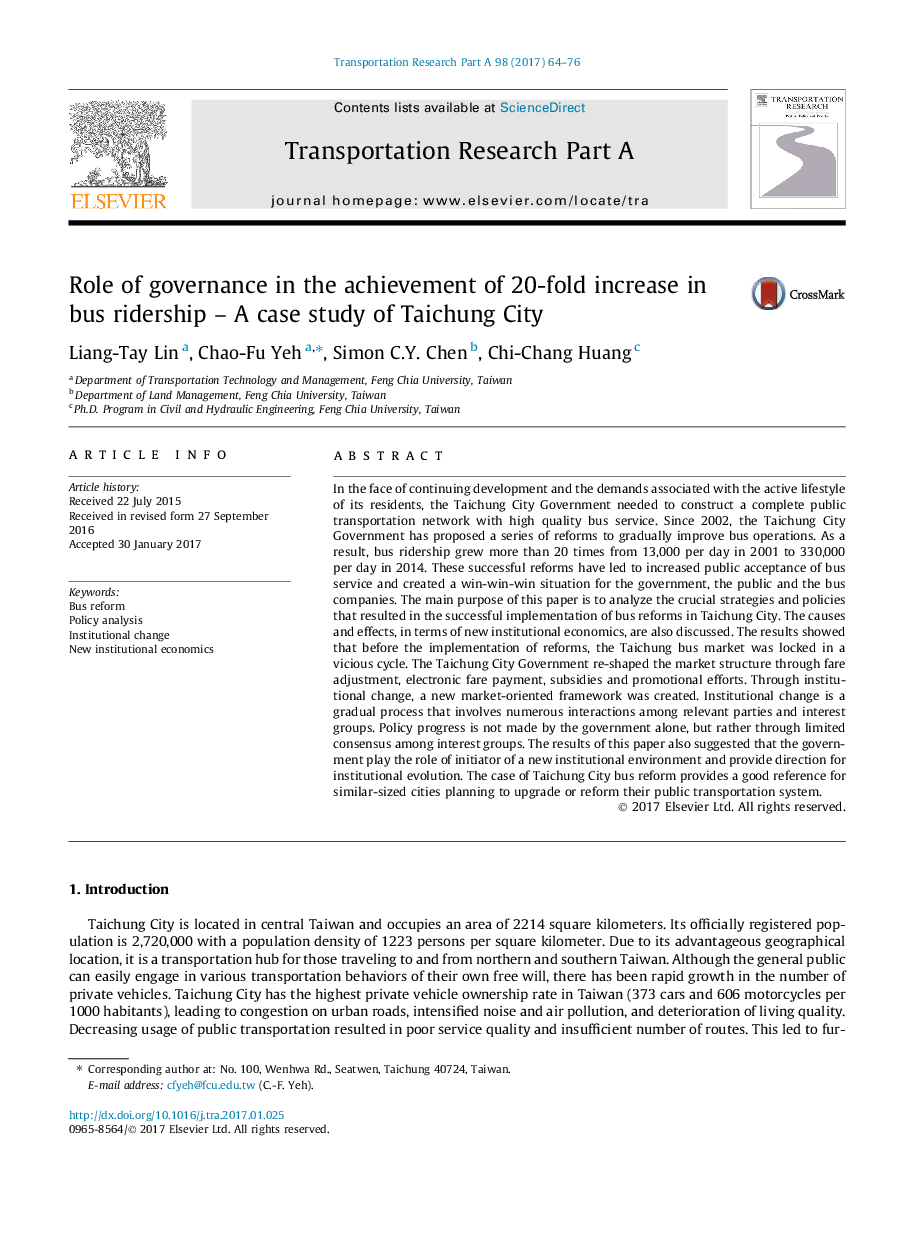| کد مقاله | کد نشریه | سال انتشار | مقاله انگلیسی | نسخه تمام متن |
|---|---|---|---|---|
| 4929141 | 1432202 | 2017 | 13 صفحه PDF | دانلود رایگان |
عنوان انگلیسی مقاله ISI
Role of governance in the achievement of 20-fold increase in bus ridership - A case study of Taichung City
ترجمه فارسی عنوان
نقش حکومت در دستیابی به افزایش 20 برابر در رانندگی اتوبوس - مطالعه موردی شهر تاچونگ
دانلود مقاله + سفارش ترجمه
دانلود مقاله ISI انگلیسی
رایگان برای ایرانیان
کلمات کلیدی
اصلاح اتوبوس، تجزیه و تحلیل سیاست، تغییرات سازمانی، اقتصاد نهادی جدید،
ترجمه چکیده
در مواجهه با توسعه مستمر و مطالبات مربوط به شیوه زندگی فعال ساکنان آن، دولت شهر تاچونگ نیاز به ساختن یک شبکه کامل حمل و نقل عمومی با سرویس اتوبوس با کیفیت بالا داشت. از سال 2002، دولت شهر تاچونگ تعدادی از اصلاحات را پیشنهاد کرده است تا به تدریج عملیات اتوبوس را بهبود بخشد. در نتیجه، سوار اتوبوس بیش از 20 برابر از 13،000 در سال در سال 2001 به 330،000 در هر روز در سال 2014 افزایش یافت. این اصلاحات موفق به افزایش پذیرش عمومی خدمات اتوبوسرانی و ایجاد یک وضعیت برنده برنده برای دولت، عمومی و شرکت های اتوبوس. هدف اصلی این مقاله تجزیه و تحلیل استراتژی های مهم و سیاست هایی است که به موفقیت اجرای اصلاحات اتوبوس در شهر تاچونگ منجر شده است. علل و اثرات، از لحاظ اقتصادی جدید نهادی، مورد بحث قرار گرفته است. نتایج نشان داد که قبل از اجرای اصلاحات، بازار اتوبوس تاچونگ در یک چرخه بدبین قرار داشت. دولت شهر تاچونگ ساختار بازار را از طریق تنظیم هزینه، پرداخت کرایه الکترونیکی، یارانه ها و تلاش های تبلیغاتی دوباره شکل داد. از طریق تغییرات نهادی، یک چارچوب جدید برای بازار ایجاد شد. تغییرات نهادی یک فرآیند تدریجی است که شامل تعاملات متعدد بین احزاب و گروه های ذینفع می شود. پیشرفت سیاست تنها توسط دولت انجام نمی شود، بلکه صرفا از طریق توافق محدود میان گروه های علاقه مند است. نتایج این مقاله همچنین نشان می دهد که دولت نقش آغازگر یک محیط سازمانی جدید و هدایت جهت تحول نهادی را ایفا می کند. مورد اصلاح اتوبوس های تاچونگ شهر، مرجع خوبی برای شهرهای با اندازه های مشابه است که برنامه ریزی برای ارتقاء یا اصلاح سیستم حمل و نقل عمومی خود را دارند.
موضوعات مرتبط
مهندسی و علوم پایه
سایر رشته های مهندسی
مهندسی عمران و سازه
چکیده انگلیسی
In the face of continuing development and the demands associated with the active lifestyle of its residents, the Taichung City Government needed to construct a complete public transportation network with high quality bus service. Since 2002, the Taichung City Government has proposed a series of reforms to gradually improve bus operations. As a result, bus ridership grew more than 20 times from 13,000 per day in 2001 to 330,000 per day in 2014. These successful reforms have led to increased public acceptance of bus service and created a win-win-win situation for the government, the public and the bus companies. The main purpose of this paper is to analyze the crucial strategies and policies that resulted in the successful implementation of bus reforms in Taichung City. The causes and effects, in terms of new institutional economics, are also discussed. The results showed that before the implementation of reforms, the Taichung bus market was locked in a vicious cycle. The Taichung City Government re-shaped the market structure through fare adjustment, electronic fare payment, subsidies and promotional efforts. Through institutional change, a new market-oriented framework was created. Institutional change is a gradual process that involves numerous interactions among relevant parties and interest groups. Policy progress is not made by the government alone, but rather through limited consensus among interest groups. The results of this paper also suggested that the government play the role of initiator of a new institutional environment and provide direction for institutional evolution. The case of Taichung City bus reform provides a good reference for similar-sized cities planning to upgrade or reform their public transportation system.
ناشر
Database: Elsevier - ScienceDirect (ساینس دایرکت)
Journal: Transportation Research Part A: Policy and Practice - Volume 98, April 2017, Pages 64-76
Journal: Transportation Research Part A: Policy and Practice - Volume 98, April 2017, Pages 64-76
نویسندگان
Liang-Tay Lin, Chao-Fu Yeh, Simon C.Y. Chen, Chi-Chang Huang,
